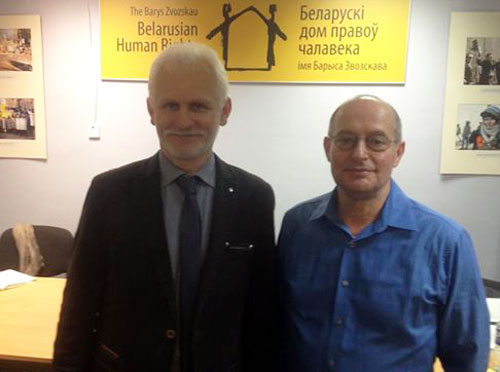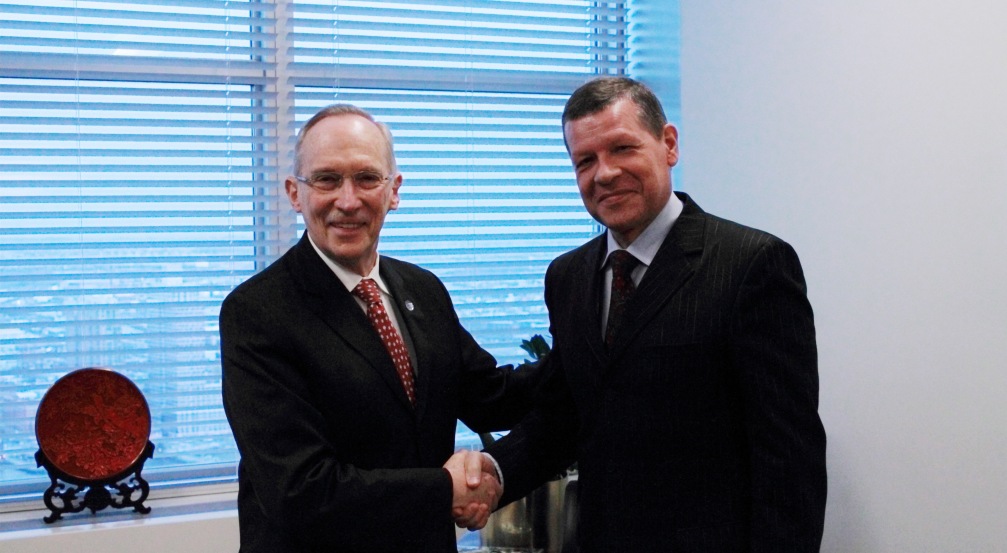Belarus refuses to support Russia over Crimea issue at the UN

Kolya Lukashenka and Vladimir Makei at the UN
Efforts of the Belarusian diplomacy at the main part of the 70th session of the UN General Assembly at the end of 2015 brought mixed results. Alexander Lukashenka’s statements during the high-level segments of the session went largely unnoticed.
Belarusian diplomats did rather well on the issues of human trafficking and international cooperation in recovery of the areas affected by Chernobyl. Anxious to maintain good working relations with the IAEA, Belarus even refused to support Russia's protest over the status of Crimea.
But Belarus’ desperate fight against international human rights criticism had no immediate effect. The country's efforts to secure an observer status for the Eurasian Economic Union at the UN failed so far.
Fighting UN human rights procedures
At this session, Belarus came close to declaring an all-out war to the UN Human Rights Council (HRC). It has been using all means available to force it into abandoning the practice of special procedures and country-specific resolutions.
 Belarus became a target of a country-specific procedure in 2012. Then, the HRC established the mandate of a special rapporteur on Belarus and appointed Miklós Haraszti to this position. Ever since, Belarusian authorities have refused to recognise this mandate and stubbornly ignored Haraszti’s attempts to establish communication with the Belarusian government.
Belarus became a target of a country-specific procedure in 2012. Then, the HRC established the mandate of a special rapporteur on Belarus and appointed Miklós Haraszti to this position. Ever since, Belarusian authorities have refused to recognise this mandate and stubbornly ignored Haraszti’s attempts to establish communication with the Belarusian government.
Minsk is no longer eager to cooperate with the HRC's thematic procedures. Michel Forst, special rapporteur on the situation of human rights defenders, named Belarus among the states, which failed to respond to his repeated requests for a country visit.
Belarus: a UN body is used for settling political scores Read more
At this session, Belarus strongly defended its “fellows in misery” and voted against the UN resolutions on human rights situation in North Korea, Iran and Syria. The Belarusian delegation maintained that the country-specific mechanisms enabled the “states with the resources to do so” to legitimise their own unilateral measures.
The Belarusian delegation insisted on several occasions that the Human Rights Council was becoming a platform for “settling political scores” and the setting of standards not agreed upon internationally.
This conviction led Belarus to requesting a vote on a resolution on the report of the Human Rights Council. In its vote against the resolution, Belarus was seconded only by Israel, which disagrees with the HRC’s treatment of the issue of Palestinians' rights.
Capitalising on the fight against human trafficking
Belarus successfully introduced a resolution on improving the coordination of efforts against trafficking in persons. The resolution adopted by consensus has decided to convene a high-level meeting on this topic at the 72nd session of the General Assembly in 2017, immediately after the general debate.
Alexander Lukashenka will most likely go to New York on this occasion to score points on his diplomats’ most successful international initiative.
Indeed, this Belarusian undertaking enjoys strong support even from the countries, which criticise Belarus on other issues, such as the United States. The representative of Luxembourg, who spoke on behalf of the EU, welcomed the introduction of the resolution by Belarus, as well as its readiness to take views into account during the negotiation process.
Belarus also succeeded in getting itself re-elected to the UN Commission on International Trade Law for another six-year term beginning 27 June 2016.
Rekindling the topic of Chernobyl
After the Belarusian authorities took a political decision in 2006 to build a nuclear power plant in the country, the Chernobyl disaster moved down on Belarus’ foreign policy agenda.
Nevertheless, Belarus is determined to use the 30th anniversary of this nuclear accident in 2016 to secure further international assistance for the long-term recovery of the affected areas.
 On 7 – 10 December, deputy foreign minister Valentin Rybakov visited the UN headquarters. There he met a number of high UN officials to discuss two priority Chernobyl-related events.
On 7 – 10 December, deputy foreign minister Valentin Rybakov visited the UN headquarters. There he met a number of high UN officials to discuss two priority Chernobyl-related events.
On 26 April 2016, the General Assembly will held a special commemorative meeting, initiated in 2013 jointly by Belarus, Russia and Ukraine, in observance of the 30th anniversary of the Chernobyl catastrophe.
More importantly, in April 2016, Belarus will host a high-level international conference dedicated to the forthcoming anniversary. The UN Secretary-General Ban Ki-moon and other high officials may come to Minsk to attend this event.
The Belarusian authorities expect the conference to help shaping the new strategic plan on Chernobyl issues for the period after 2016, when the current policy framework will expire.
Belarus fails to support Russia in its fight on Crimea issue Read more
Anxious to maintain good relations with the UN agency involved in the post-Chernobyl assistance, Belarus even refused to support Russia in its demarche against the report of the International Atomic Energy Agency (IAEA) by the General Assembly. Russia requested a vote on the resolution, which was always adopted by consensus, because the report of the IAEA spoke of Crimea as “occupied territory”.
Russia and nine other countries abstained during the voting. However, Belarus refused to join them. A representative of Russia’s closest ally stated after the vote that his country had endorsed the resolution since it supported the IAEA’s activities and its annual report.
Seeking international recognition of the Eurasian Integration
The Belarusian diplomacy tried hard to play the card of the country’s presidency in the newly-born Eurasian Economic Union (EAEU) in 2015 to strengthen Belarus’ international status. The foreign ministry regarded the acquisition by the EAEU of the observer status in the UN General Assembly as a major point in this strategy. Getting the status was also one of Belarus' declared priorities for the 70th session.
This initiative, which Belarus’ delegation tabled at the UN on 19 October, went astray from the start, when Georgia and Azerbaijan opposed it. The two countries used this opportunity to remind the fellow UN member states about their grievances in the bilateral relations with Russia and Armenia respectively.
EAEU's observer status falls a prey to bilateral grievances of ex-USSR countries Read more
The consultations on the EAEU observer status, which went on an almost daily basis, failed to forge a consensus. On 20 November, Azerbaijan reiterated its opposition to this decision noting that its objection was in regards to the presence of Armenia as member. Two countries are at odds over the status of Nagorno-Karabach.
The delegation of Turkey backed up Azerbaijan’s position saying that, as the EAEU’s founding document was long and had many addenda and protocols, Turkey required more time to examine it.
As the delegation of Belarus was loath to initiate a vote on the draft resolution, the Legal Committee agreed to defer a decision on the request for the observer status to the next UNGA session. Belarus thus failed to secure this status for the EAEU during its presidency in the organisation.
The 70th UNGA session clearly demonstrated that, in order to succeed in multilateral diplomacy, Belarus needs to move further away from the Russian world and embrace constructive cooperation with Western democracies.




 Onerous visa requirements, combined with an underdeveloped service industry, undermine the country’s efforts to attract foreign visitors.
Onerous visa requirements, combined with an underdeveloped service industry, undermine the country’s efforts to attract foreign visitors. On Tuesday, a provocative article appeared in the pro-Kremlin Russian daily, Vzglyad. It demanded that Belarus hold a referendum on becoming a part of Russia or else face Ukraine's fate.
On Tuesday, a provocative article appeared in the pro-Kremlin Russian daily, Vzglyad. It demanded that Belarus hold a referendum on becoming a part of Russia or else face Ukraine's fate.  At the end of January, Belarus temporally mobilised nearly 15,000 reservists – a large number for the nearly 50,000-strong national army.
At the end of January, Belarus temporally mobilised nearly 15,000 reservists – a large number for the nearly 50,000-strong national army.  The EUobserver reported last week that Belarus might start talks over a visa-free regime with the EU, citing senior officials from the Latvian EU presidency.
The EUobserver reported last week that Belarus might start talks over a visa-free regime with the EU, citing senior officials from the Latvian EU presidency.  The summer holidays proved to be productive for the relations of Belarus with both "old" and "new" Europe.
The summer holidays proved to be productive for the relations of Belarus with both "old" and "new" Europe. 